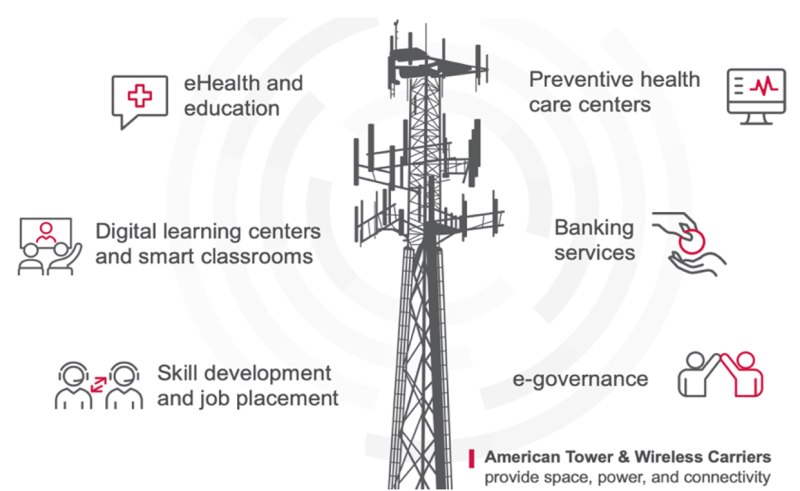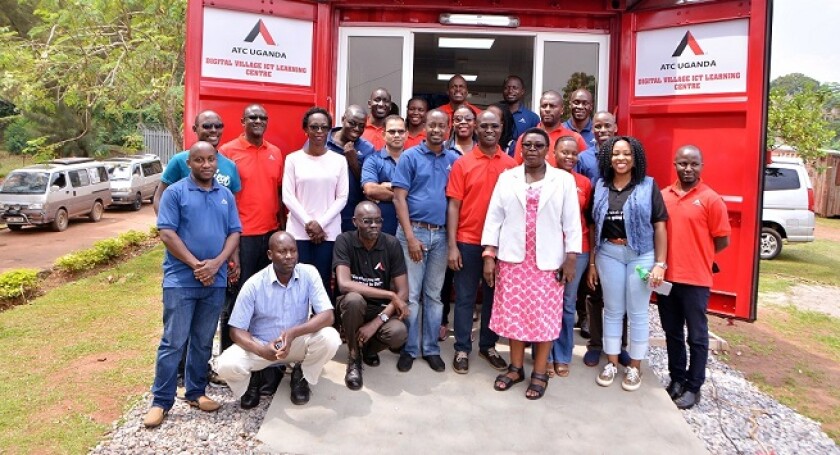In many communities telecom towers are islands of reliable power and connectivity in a sea of scarcity. American Tower has developed Digital Communities (DC) to share that reliability as education centres. The global towerco has established 284 DCs in Africa, India and Latin America and is seeking new partners to expand the programme. As well as being a huge boon for local community relations, the project helps upskill local populations, improves access to employment and reduces gender inequality. TowerXchange speaks with Ravi Suchak about the programme, and how American Tower plans to take it forward.
American Tower will be taking part in TowerXchange Meetup Africa on October 5-7 online. Join them here.
TowerXchange: Give us the basic outline of a Digital Community, and why is American Tower investing in education in Africa? What are the origins of this initiative?
Ravi Suchak, Vice President, Public Affairs – EMEA, American Tower
The reach and benefits of the internet remain limited in many developing countries due to cost, scalability, power outages and educational barriers. To help alleviate this problem, ATC is using its communications infrastructure in an innovative way by building DCs near its tower sites.
The goal of the DCs programme is to increase digital literacy and create digitally empowered societies to help countries and communities address some of their most pressing challenges, including reduction of poverty, unemployment, economic inequality, access to quality education and achieving gender equality, as aligned with the U.N.’s Sustainable Development Goals (SDGs).
ATC has established 284 DCs across India, Africa and Latin America with nearly 125,000 students enrolled in ICT training courses and more than 116,000 graduates since inception. Our aim is to grow the programme with strategic partners and create more DCs in markets where ATC owns tower infrastructure to enable users to learn without boundaries and expand their horizons through technology.
This year, our DCs won the prestigious U.N. World Summit on the Information Society (WSIS) Prize 2021, which identifies the year’s most innovative and high-impact ICT projects from around the world and is awarded in recognition of their contribution to achieving the SDGs.

TowerXchange: There’s some overlap, but building a small school is a long way from running a cell site, tell us about how your Digital Communities currently run, how building and maintenance are managed and how it fits in with your schedules, does the whole office pitch in?
Ravi Suchak, Vice President, Public Affairs – EMEA, American Tower
DCs are computer-equipped learning centres that use the uninterrupted power supply and broadband connection from ATC's tower sites to enable internet access and provide local communities with free education and training in ICTs.
By using the uninterrupted power supply and broadband connection from ATC's tower sites, DCs enable internet access and provide local communities with free education and training in ICTs as well as other services. Access to ICTs and education helps communities address some of their most pressing challenges, including reduction of poverty, unemployment, economic inequality and achieving gender equality.
ATC is responsible for the management and maintenance of the tower site. Ideally, the sustainability of DCs depends on community involvement and buy-in from their inception and through their growth. This is the only way to ensure maximum impact and community ownership of the concept.
Indeed, ATC staff are encouraged to take part in the initiative and the associated benefits provided. This includes mentoring girls in ICT, promoting STEM, identifying employment and entrepreneurship opportunities, and encouraging our partners to do the same.
From an environmental conservation point of view, DCs have a small ecological footprint which will continue to decrease as ATC continues to reduce its Scope 1 fossil fuels emissions and increase the use of energy-efficient technologies and site-based green energy solutions, such as solar power generation. ATC has committed to reduce its fossil fuel consumption and diesel-related greenhouse gas emissions in Africa and India by more than 60% by 2027.

TowerXchange: What do you want your students to ultimately get out of it?
Ravi Suchak, Vice President, Public Affairs – EMEA, American Tower
Ultimately, we want to play our part in bridging the digital divide and bring the unconnected on board in our increasingly digitised world. And this extends beyond our students, we want to reach communities. The objective is to have our students share their ICT knowledge to drive digital literacy in their homes, among family members, at their learning institutions, places of business – exponentially.
DCs also facilitate the delivery of a large suite of ICT applications that are being increasingly digitalised and migrated to online ecosystems, including e-government services, remote learning, healthcare and banking. Through these channels, DCs have a direct impact on the challenge of inclusion and enable more people to be covered by public and private services.
One of our aims is to impart digital skills and empower the participants to move their lives and careers in the right direction. We also want to help them acquire ICT skills that will give them a shot at global opportunities and develop entrepreneurial skills for e-commerce platforms.
TowerXchange: Who delivers the training or education and how do you find partners on the ground?
Ravi Suchak, Vice President, Public Affairs – EMEA, American Tower
Training is typically delivered by ICT training consultants, government ICT agencies and NGOs who tailor learning programmes based on the needs of a particular community. Some of our DCs also used cloud-based learning tools, such as IBM’s “Digital-Nation Africa” platform.
TowerXchange: American Tower is looking for corporate partners to help fund new communities, what sort of commitment is required and what is in it for your new partners? Would you continue to run the Digital Communities in-house?
Ravi Suchak, Vice President, Public Affairs – EMEA, American Tower
DCs are deployed in collaboration with a wide range of domestic and international partners from the public, private and not-for-profit sector. Examples include the Uganda Communications Commission, IBM, NIIT Foundation and Save the Children. This directly reinforces the need for cross-sector and cross-country collaboration in the pursuit of sustainable development, something captured by SDG Goal 17.
In India, for instance, ATC partnered with Hewlett Packard Enterprise and CSC e-governance Services India ltd. (promoted by the Ministry of Electronics & Information Technology) to sign a tripartite agreement for setting up 30 cloud enabled digital villages in the states of Uttar Pradesh and Bihar. These are aimed to provide a gamut of digital services to rural and underserved communities as part of the Prime Minister’s Digital India programme like digital literacy and digital smart classrooms by ATC, e-health centres and Wi-fi hotspots by HPE and e-governance services as well as implementation at local level through Common Service centres.
In Nigeria, ATC has established 64 DCs across 25 states, delivering digital content in partnership with IBM, LSETF, Ondo State Ministry of Science and Technology and others.
Another example is Mexico, where NGO, Save the Children, uses DCs to teach reading and writing skills and offer summer courses, in addition to providing traditional technology courses.
To grow the project, however, we need to forge alliances with like-minded partners to join us on this journey. The DCs concept is evolving and amenable to adaptations which best suit the country and community hosting them. It’s a flexible, scalable model to deliver connectivity-enabled services across the countries we operate in.

TowerXchange: Tell us about the capex required to set up a new community”, describe the building, how you provide the power and connectivity and what IT equipment and services are provided. How about running costs?
Ravi Suchak, Vice President, Public Affairs – EMEA, American Tower
This varies considerably from market to market and the type of DC deployed. In Africa, for example, the DC structure comprises a 12-foot shipping container retrofitted to accommodate 12 workstations, 12 computers, internet, TV, white board, air-conditioner, and CCTV. The facility is connected to the nearest site power source. Daily classes are held based on the training schedule developed by the education providers. DC’s capex and opex are funded by ATC.
TowerXchange: To what extent have you created a “cookie cutter” approach that will allow you to scale the project rapidly in new markets once you have partners and funding?
Ravi Suchak, Vice President, Public Affairs – EMEA, American Tower
Although the general DC concept can be replicated fairly easily, we don’t necessarily follow a “copy-paste” approach given the divergent socio-economic needs in different countries, and indeed from community to community. Establishing DCs in partnership with host governments and communities, private sector entities and non-profit organisations, underscores the importance of multi-stakeholder collaboration to advance sustainable development. DCs create access to quality education and boost digital literacy. The quality of the education is positively reinforced through international and regional cooperation.
DCs are an enabler for decent work and economic growth. By building digital literacy, DCs are directly associated with people’s ability to improve and retain the skills, knowledge and tools needed to do their jobs competently or to a greater capacity. Through this link, the impact of DCs can be traced from the small-scale effect of a particular village to larger-scale competitiveness in the global marketplace.
DCs also have a significant impact on female access to connectivity, something often precluded in certain domestic settings. This increased access in public spaces has direct impact on gender equality, allowing women to engage through ICT in critical areas such as education and finance. The positive effects of these initiatives are amplified when they rest on a solid network of international and regional cooperation.
TowerXchange: How does management of the site work, do you work with the same landlord, do you do much work to maintain good relations with people who live nearby? What’s the ongoing commitment like?
Ravi Suchak, Vice President, Public Affairs – EMEA, American Tower
In most cases we work with the same landlord. Pre-deployment engagements are held with the community to inform them about the DC and its benefits, and periodic engagements continue especially through graduation ceremonies. The space where the structure is located is allocated rent free by generous communities and landlords for the DC facility.
TowerXchange: Tell us about your global footprint at the moment and your expansion plans? Do you need a critical mass of interest to accelerate roll-out, or can you start small?
Ravi Suchak, Vice President, Public Affairs – EMEA, American Tower
ATC’s ambition is to grow the programme with strategic partners and expand to 2,000 DCs over the next five years. We will launch DCs in markets where ATC owns tower infrastructure to enable users to expand their educational and employment prospects through technology and benefit from connectivity-enabled services.
People should get in contact with Mneesha Nahata, Chief Sustainability Officer, American Tower Corporation (mneesha.nahata@americantower.com) if they want to partner with American Tower to create more Digital Communities.
American Tower will be taking part in TowerXchange Meetup Africa on October 5-7 online. Join them here.

